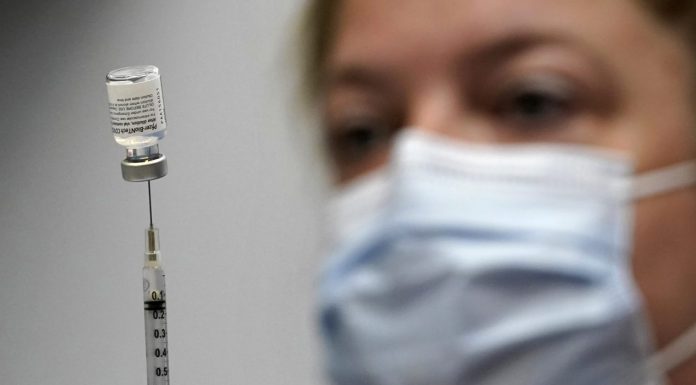(Headline USA) An influential federal advisory panel has soundly rejected a plan to offer Pfizer booster shots against COVID-19 to most Americans.
The vote Friday, 16-2, was a blow to the Biden administration’s effort to foist the highly controversial vaccines onto a skeptical public through unconstitutional vaccine mandates.
Over several hours of discussion, members of the Food and Drug Administration panel of outside experts voiced frustration that Pfizer had provided little data on safety of extra doses.
And they complained that data provided by Israeli researchers about their booster campaign might not be suitable for predicting the U.S. experience.
The panel, made up of outside experts who advise the Food and Drug Administration, weighed a less than clear-cut case: While research suggests immunity levels in those who have been vaccinated wane over time and boosters can reverse that, the Pfizer vaccine is still highly protective against severe illness and death, even amid the spread of the highly contagious delta variant.
The FDA experts voted on one basic question: Does the evidence show that a Pfizer booster would be safe and effective for people 16 and older?
But that is just one step in the process. The more thorny question of who should get the shots and when will be debated on Wednesday by advisers to the Centers for Disease Control and Prevention. The CDC generally adopts the recommendations of the group, which sets policy for U.S. vaccination campaigns.
The CDC has said it is considering boosters for older people, nursing home residents and front-line health care workers, rather than all adults.
Separate FDA and CDC decisions will be needed in order for people who received the Moderna or J&J shots to get boosters.
At Friday’s meeting, the FDA panelists heard full-throated arguments about the need for boosters from both Pfizer and health officials from Israel, which began offering boosters to its citizens in July.
Sharon Alroy–Preis of Israel’s Ministry of Health said the booster dose improves protection tenfold against infection in people 60 and older.
“It’s like a fresh vaccine,” bringing protection back to original levels and helping Israel “dampen severe cases in the fourth wave,” she said.
And representatives for Pfizer argued that it is important to shore up immunity before protection against severe disease starts to erode.
A company study of 44,000 people showed effectiveness against symptomatic COVID-19 was 96% two months after the second dose, but had dropped to 84% by around six months.
Both Pfizer and the Israeli representatives faced pushback from panelists. Several expressed skepticism about the relevance of Israel’s experience to the U.S. Also complicating the committee’s decision: No one yet knows the antibody level below which infection is likely and boosters are needed.
“That would be a great way for us to monitor if we really needed booster shots,” said Dr. James Hildreth, president of Meharry Medical College.
FDA vaccine reviewer Dr. Philip Krause raised a host of questions about the reliability of one of the key studies Pfizer said showed that immunity is waning.
Another concern was whether third doses would exacerbate serious side effects.
Dr. Cody Meissner of Tufts Medical Center said he is worried about extra doses for younger age groups given the risk of heart inflammation that has been seen in mostly younger men after a second dose. While the condition is very rare, he said, it is not clear if that risk would increase with another dose.
Pfizer pointed to Israeli data from nearly 3 million boosters to suggest side effect rates would be similar to that seen after second doses.
Dr. Paul Offit, a vaccine expert at Children’s Hospital of Philadelphia, said he was more likely to support approving a third dose for adults over 60 or 65 but “I really have trouble” supporting it for anyone down to age 16.
While an extra shot likely will at least temporarily decrease cases with mild or no symptoms, “the question becomes what will be the impact of that on the arc of the pandemic, which may not be all that much,” Offit said.
President Joe Biden’s top health advisers, including the heads of the FDA and CDC, first announced plans for widespread booster shots a month ago, targeting the week of Sept. 20 as an all-but-certain start date. The administration said boosters would be dispensed eight months after the second dose of the Pfizer and Moderna vaccines.
But that was before FDA staff scientists had completed their own assessments of the data. Some experts questioned whether Biden was breaking his own pledge to “follow the science” on COVID-19 by getting out ahead of government scientists.
Earlier this week, two top FDA vaccine reviewers joined a group of international scientists in publishing an editorial rejecting the need for boosters in healthy people. The scientists said continuing studies show the shots are working well despite the delta variant.
On Friday, U.S. Surgeon General Dr. Vivek Murthy said that in announcing its booster plan, the Biden administration was not trying to pressure regulators to act but was instead trying to be transparent with the public and be prepared in the event that extra shots won approval.
“We have always said that this initial plan would be contingent on the FDA and the CDC’s independent evaluation,” Murthy said.
The Biden plan has also raised major ethical concerns about impoverished parts of the world still clamoring for vaccine.
But the administration has argued that the plan is not an us-or-them choice, noting that the U.S. is supplying large quantities of vaccine to the rest of the globe.
The U.S. has already approved Pfizer and Moderna boosters for certain people with weakened immune systems, such as cancer patients and transplant recipients.
Some Americans, healthy or not, have managed to get boosters, in some cases simply by showing up and asking for a shot. And some health systems already are offering extra doses to high-risk people.
Adapted from reporting by the Associated Press

